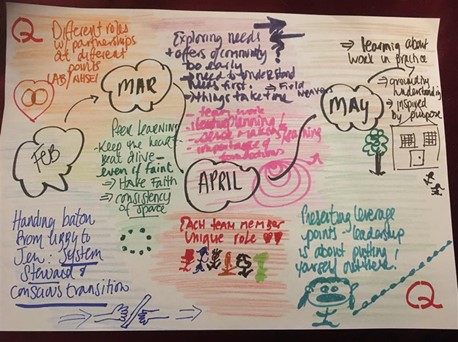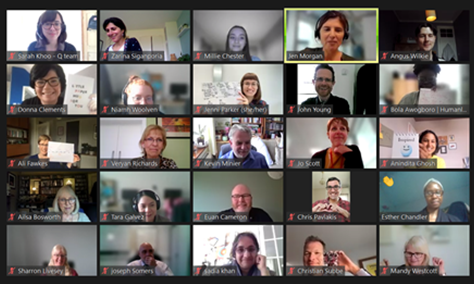It feels like only yesterday that I was reflecting on our Q Lab UK kick off workshop. I can vividly remember how excited I was to meet all of our Lab participants, to hear how connected to and experienced they were on the topic of trust and confidence in tech-enabled remote monitoring, and to be challenged in my thinking.
Alongside the excitement, it was also a steep learning curve for me. This was the first Q Lab UK project I had designed and we were running it totally virtually! How would networking and connecting translate to a virtual space? Are half-day workshops too long? What’s the best frequency of workshops to ensure we keep up the momentum? Over the duration of the Lab, I’ve certainly grown in confidence, and have felt so energised by the workshop conversations with our motivated and passionate community.
And now here we are, six months later, already reflecting on the sixth and final Q Lab UK workshop of the design process.

The final workshop provided the opportunity to celebrate the great progress made to date, spotlight our learning on the topic, and to hear from test teams.
We then spent time to think about how we can continue to build on the momentum we have created.
It has been really inspiring to witness the dedication, progress and leadership throughout the process.
To those of you that attended the workshop or have participated in the Lab in one way or another over the past six months, thank you. It has been really inspiring to witness the dedication, progress and leadership throughout the process. Tackling complex challenges is not easy. However, supporting this growing community is a great place to start to make change.
Read on to find out what we got up to.
Session 1: sharing our personal learning journeys
Our first activity provided the space for us all to pause, reflect on and consolidate what we’ve learnt over the past six months. This includes both the topic of trust and confidence in tech-enabled remote monitoring, and about the Lab process itself.
To do this, we asked Lab participants to create a visual personal learning journey of their whole experience of the Lab process. The aim of this wasn’t to create an artistic masterpiece (though we were pretty impressed with the efforts!). Rather, we know that drawing things out can bring things to life in a different way and can invite more storytelling and connection.
I personally really value this method: I have used it often and love how it generates deep, rich discussions. It can enable people’s voices to be heard in a different way, especially those who aren’t as vocal in larger group discussions.

Session 2: learning from the test teams
Since November, we’ve been supporting four test teams to explore the challenge in their local contexts, and to develop ideas that address how we can build staff and patient trust and confidence in remote monitoring.
Working with the teams has been one of my highlights: seeing them work through the ‘lightbulb moments’ and address some of the obstacles in their way.
In our second session, the test teams told us about their learning and progress to date. Each team shared more about the problems they’ve been tackling, what has worked well and why, and what has been difficult.
Working with the teams has been one of my highlights: seeing them work through the ‘lightbulb moments’ and address some of the obstacles in their way. It was an absolute delight to hear them share their progress and we look forward to following their journey through the next phase of the Lab.
Session 3: next steps for Q Lab UK
Over the next 18 months, the Q Lab UK team’s focus will shift to providing the infrastructure for the test teams to scale their work. However, we’ll still be playing a role to support the wider community to continue to learn and act together as a whole.
In our final session, we spent time thinking about how we can continue to build collective momentum as a community. We explored the question: ‘How do we keep the learning community alive through opportunities for you to continue to connect, learn and share your work?’
We shared some ideas on what this could look like and gave people a chance to reflect on anything else they’d like to see. As a team, we will collate these ideas, and consider what will be most useful and impactful for Lab participants.

What next?
Now that the design phase is complete, we’re moving into the grant funding phase of Q Lab UK. With the NHS, in partnership for digital health and care, we will support teams with funding into 2023. Teams with the potential to develop their ideas and interventions beyond the six-month design process will be invited to apply for this funding.
The funding will support teams to reach the next stage of development. We recognise that the ideas are at an early stage, and we will support teams to demonstrate the feasibility of their ideas and consider approaches to spread and scale.
We also continue to collate our learning and insights on the topic and will be sharing these with you in the coming months.
This Q Lab UK project has been a journey of dedication, openness to learn new things, a willingness to sit with discomfort and a desire to connect with others.
This Q Lab UK project has been a journey of dedication, openness to learn new things, a willingness to sit with discomfort and a desire to connect with others. It is truly inspiring what has been accomplished so far. I think I speak for the whole Lab team when I say we’re looking forward to seeing how we build on the foundations and momentum of the last few months.
Have you got any questions, or any ideas about how we can continue to build momentum as a community? Please share your ideas in the comments – we’d love to hear them.
Comments
Thomas John Rose 4 Dec 2022
Hi. Do you have any documentation illustrating your design process please?
Thomas John Rose 16 Mar 2023
Hi. Do you have any documentation illustrating your design process please? I.e. What was your design brief and how you managed the co-design aspect.